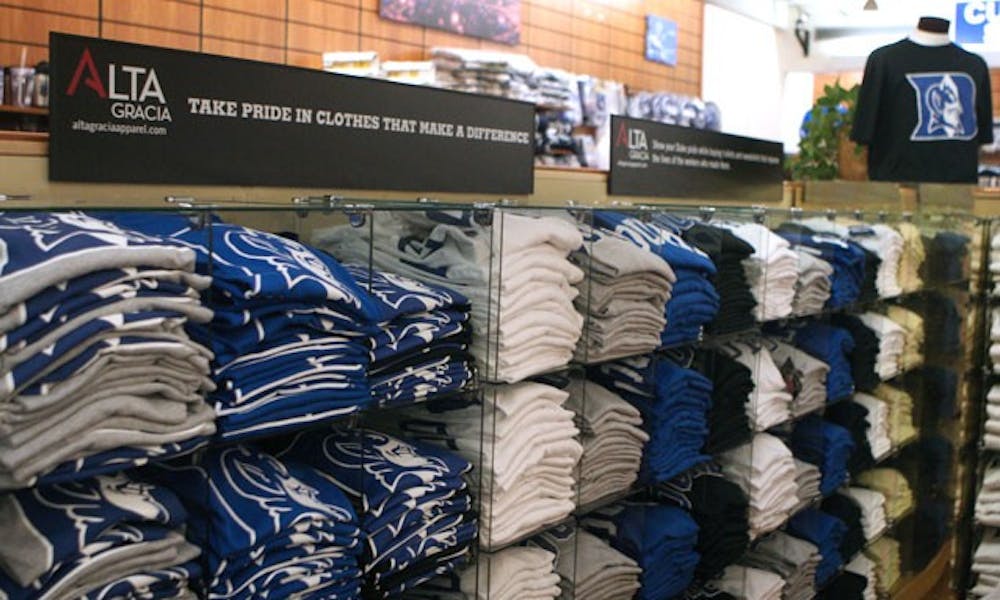The University Store has a fresh face at its entrance—and she’s greeting customers with a new message.
“With every purchase, you are supporting a better life for our community,” Yolanda Simon says on an oversized poster recently placed at the store front.
Simon is one of 120 employees at the recently-opened Alta Gracia factory located in the Dominican Republic’s Villa Altagracia that is now supplying Duke apparel. The poster is part of an extensive marketing campaign to encourage members of the Duke community to buy into ethical work standards.
“We’re really thrilled to have the opportunity to sell these products—Duke has long wanted to be able to source apparel from factories where compliance with the code of conduct is guaranteed,” said Jim Wilkerson, director of Duke stores and trademark licensing.
Wilkerson’s work with anti-sweatshop policies dates back to 1998, when he spearheaded efforts to implement a set of labor regulations for University suppliers. The code was widely applauded for setting standards higher than those of any other university, and was subsequently used as a template for labor violations rules.
The University’s $250,000 order of Alta Gracia apparel arrived two weeks ago. As of Sept. 7, the store has sold $16,000 worth of apparel—or about 750 items—and expects to sell the remaining apparel by the end of the year, Wilkerson said.
In the Alta Gracia section of the University Store—located just behind the national championship gear—shoppers can watch a video of worker testimonials. The factory produces T-shirts, sweatshirts and other apparel, all sporting the Duke name.
Alta Gracia’s living wage is what sets it apart from other University suppliers, Wilkerson said. A living wage is defined as enough money to provide housing, clothing, child and health care, education, transportation and saving funds for a family. The factory also recognizes the workers’ right to unionize.
“Alta Gracia is establishing a model for this industry of how clothing should be made. We hope others will follow their lead,” said Scott Nova, executive director of the Worker Rights Consortium, an independent labor rights organization that monitors factories including those producing collegiate garments.
The WRC determined that the living wage for Villa Altagracia is $497 per month, more than three times the local legal minimum wage of $147 per month, said WRC Communications Director Theresa Haas in an Aug. 31 teleconference. Alta Gracia items are the only ones in the world bearing tags from the WRC affirming their compliance with rigorous WRC labor standards.
The factory is run by Knights Apparel, the top supplier of college-logo apparel to American universities, according to a July New York Times article. The article also stated that Duke is among 400 college campus stores selling the clothing.
The new clothing brand is not the only Duke store supplier paying living wages, however. Nova said the only other clothing factory in the developing world that pays approximately living wages is School House. The two-year-old national collegiate brand was created by Rachel Weeks, T ’07, and is based in Sri Lanka. Weeks said she does not consider Alta Gracia as competition for her company, adding that there is plenty of room in the market for multiple living wage apparel brands.
“Living wage needs to become a standard and not an exception,” Weeks said.
Although Nova said School House has developed positive relationships with Sri Lankan groups, the WRC has yet to formally investigate the factory. He added that the WRC had spoken with Weeks about investigating School House “in the not too distant future.”
Weeks said she is excited about what the addition of the Alta Gracia brand means for her alma mater and for ethical labor practices.
“I am, as a Duke alumna, and now somebody who is a Durham resident, so proud of our University for the model we’ve created for how impactful a single university market can be for improving labor standards from the Dominican Republic to Sri Lanka,” she said.
Get The Chronicle straight to your inbox
Signup for our weekly newsletter. Cancel at any time.

